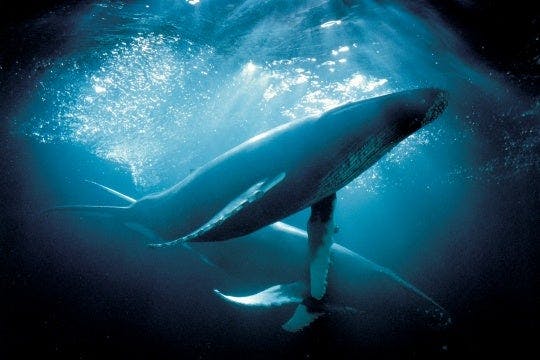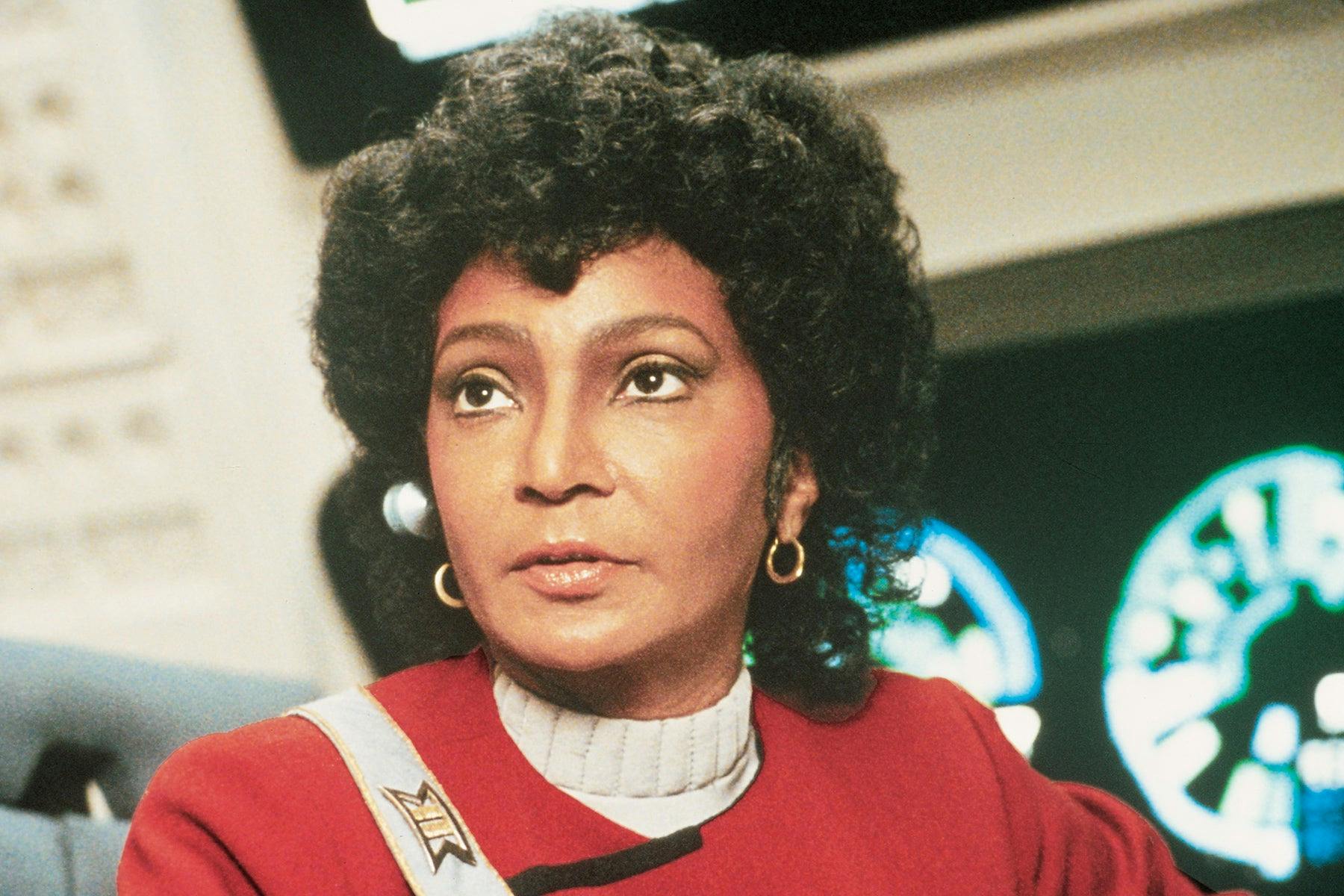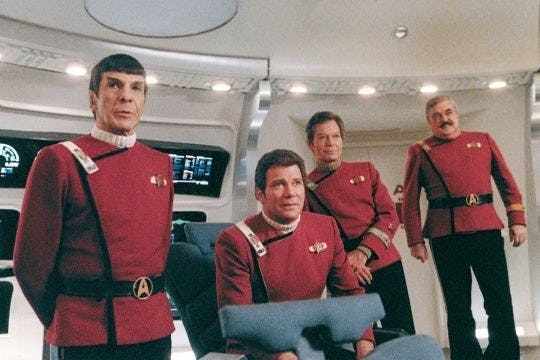Published Nov 26, 2021
The Biggest Lesson From Star Trek IV: The Voyage Home Isn't Talked About Enough
George and Gracie have a lot to say about what it means to be a good ally.

StarTrek.com
This article was originally published on July 9, 2019
When a giant space log comes to Earth and demands to speak to only whales, Captain Kirk and the crew of the U.S.S. Enterprise (who are temporarily the crew of the H.M.S. Bounty) must travel back in time to before humpback whales went extinct, in order to bring two of them back to the future to talk to the alien log and tell it to please stop sucking up all our oceans.
This is the bonkers premise of Star Trek IV: The Voyage Home (or as I like to call it, The One With the Whales), a film which was intended to be a lighthearted departure from the serious nature of the previous Star Trek films, and has aged remarkably well considering the time in which it was made. Yes, the technology is dated, and there are a few cringe-worthy lines that would never make it into a Star Trek script today, but for the most part, The One With the Whales still holds up as an entertaining romp through time with an earnest conservationist message. “Save the whales,” The One With the Whales urges, “so that one day, the whales may save us.”

StarTrek.com
This is often where analysis of Star Trek IV begins and ends, and it’s not wrong to conclude that the intended takeaway from this film is that we need to be better stewards of our planet. Even the year in which the film is set — 1986, the same year in which it was released — drives home the idea that Kirk and his crew aren’t merely addressing some symbolic future versions of humanity, but us, the very people watching the movie. "Save the whales" isn’t the subtext of The Voyage Home. It’s just… the text. Sitting right there on the surface, like a humpback whale coming up for a breath.
However, watching Star Trek IV over three decades later, I can’t help but notice another, subtler thread running through this whaletastic adventure; one which I don’t think was intended, but which resonates particularly strongly in the times we find ourselves in today. You see, in a world of seemingly limitless technology, Kirk and Spock quickly decide that it is easier to attempt time travel than to try to speak for a group they don't understand.
As soon as Spock identifies that the probe is attempting to communicate in whalesong, Kirk’s first question is whether they can artificially create similar sounds to answer back. Spock immediately shuts that idea down, saying that while he might be able to replicate the noises, he can’t even begin to understand the language. “We’d be responding in gibberish,” he tells Kirk.
While it’s understandable that the film doesn’t want to spend a lot of time attempting to decipher the linguistic intricacies of whalesong — this is Star Trek IV: The One With the Whales, after all, not Arrival — it’s still worth noting just how quickly Spock shoots down the possibility of faking their way through an important conversation in a language they don’t speak. Surely, with the technology available to them, Spock and Uhura could’ve eventually figured out a way to crack the whale code. Maybe they wouldn’t have had a perfect grasp of whale syntax and grammar, but c’mon, they’re whales, how hard can it be?

StarTrek.com
But Spock refuses to even try, leaving Kirk no other choice than to risk his entire ship and crew, slingshot around the sun, and time warp back to 1986 to liberate two humpback whales named George and Gracie from the Cetacean Institute in Sausalito, California. The rest of the movie is spent building massive water tanks in the cargo bay, plotting a whale heist, and stealing nuclear reactors. You know, normal stuff.
But let’s get back to the idea that this convoluted plot to steal whales from 300 years in the past is somehow a simpler solution than trying to communicate with a space probe. At first glance, it seems like it should require some massive suspension of disbelief to buy into this premise, but I don’t think it does, if you’re willing to embrace some deeper social themes (and really, this is Star Trek; deeper social themes are its bread and butter). Unlike, say, Armageddon, the plot of Star Trek IV really isn’t trying to pull a fast one on us by trying to convince us that an incredibly complex task is easier than the simpler option. Instead, it’s suggesting that communication is the complex task, and that to oversimplify it only contributes to — quite literally — our own destruction.
Think about it. What would’ve happened if Kirk had ordered Spock to try to program the computer to mimic whalesong? If they’d been so confident in their own humanoid superiority to assume that their voices, simulating a language and culture they didn’t understand, were the ones that most needed to be heard? Maybe they would’ve lucked into accidentally saying the right thing, but more likely, despite their good intentions, their ignorant fumbling of the microphone would have resulted in irreparable harm.
Still, it would’ve been understandable for Kirk and his crew to have taken this approach, devastating as it might have been. After all, it’s not uncommon among humans — both in 1986, and in 2019 — for the privileged to assume they know what’s best for the marginalized. We see it today all over the news cycles, as the wealthy make decisions for the working class, men speak with presumed authority on issues affecting women, and white people attempt to explain away the racism experienced by people of color. Many times, no harm is intended, but that doesn’t prevent it from occurring anyway.
A lot has been written in recent years about whatit meansto bea goodally. At the top of every list of tips, no matter which group it’s aimed at supporting, is a plea to listen. Listen to the voices of the marginalized, give them a platform to speak, and consider their perspective above your own when considering what sorts of actions need to be taken.

StarTrek.com
Of course, “listening” in the context of Star Trek IV doesn’t necessarily mean understanding, since the crew of the Enterprise has no way to know what either the whales or the space probe are saying. Interestingly, in an earlier version of the film, the mournful wailing of the space probe was actually subtitled, allowing audiences to see what it was asking: “Where are you? Can you hear us?” The subtitles were eventually deemed unnecessary and cut from the finished film, which was fortunate, since allowing the audience to understand something the characters never could, would have probably only undermined the film’s message.
Still, underneath all its Vulcan neck pinches, nuclear "wessels," and transparent aluminum, The One With the Whales isn’t so much about whales at all, but about the crew of the Enterprise being the best allies they can possibly be when faced with a problem that is significantly outside their lane. They may not be able to understand the words that are being said, but that doesn’t mean they can’t still amplify them. Star Trek IV is a film about an advanced group of people using every last ounce of their privilege to ensure that the mic gets passed to those whose lived experience and knowledge uniquely qualifies them to speak to a specific situation, and trusting that they’ll know what’s best going forward.
Yes, the marginalized group in Star Trek IV is whales, and they’re not so much marginalized as they are completely extinct. Yes, I get that that’s a very weird parallel to draw, and that no one really wants to be compared to a whale (although, in all fairness, George and Gracie are Very Good Whales). But the focus of The Voyage Home isn’t actually George and Gracie themselves, but rather, what they represent: hope for the future. And while I can only speak for myself, lifting up the marginalized as a path toward hope is a parallel I can get behind.
The end of Star Trek IV sees the H.M.S. Bounty return to the year 2286, now heavier with two whales and one rogue marine biologist. They land the ship in the ocean, release George and Gracie, and hope for the best. They have no way of telling the two whales what to say; they can only trust that they’ve done everything in their power to present the right voices with a chance to speak. They’ve provided the platform, they’ve handed over the mic, and now there’s nothing left to do other than take a seat and let their cetacean passengers do their thing.
George and Gracie speak. And the world changes for the better. The Enterprise crew’s decision proves to be the right call. And it still is today.
Lauren Thoman is a freelance writer and pop culture enthusiast who lives in Nashville, TN, with her husband, two daughters, and a perpetually confused dog. Her writing has appeared on Vulture, Collider, Looper, and Mic, among other places. Would happily eat tacos for every meal.

